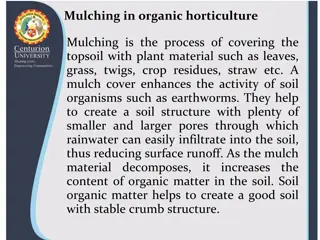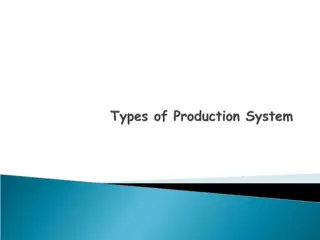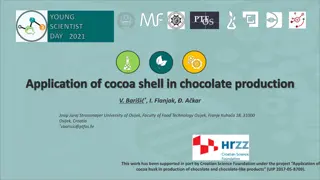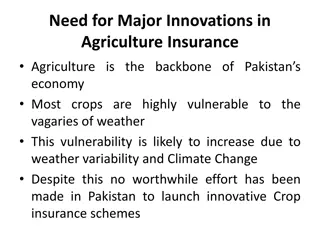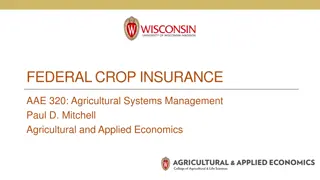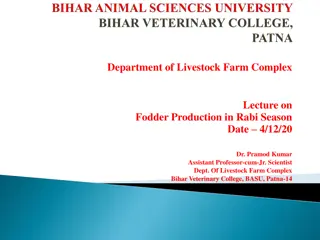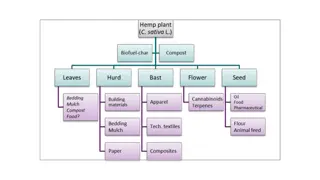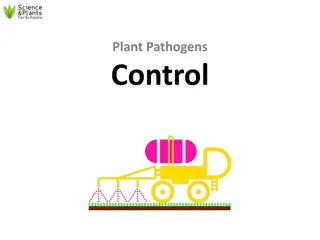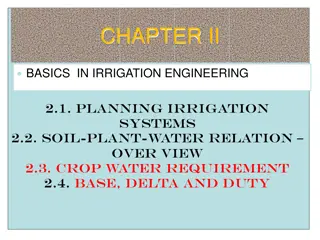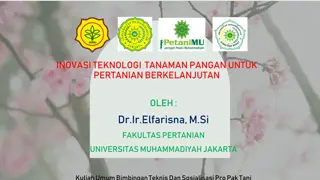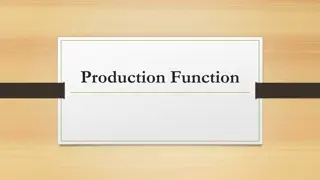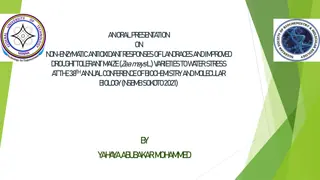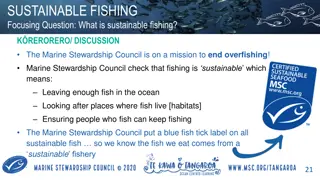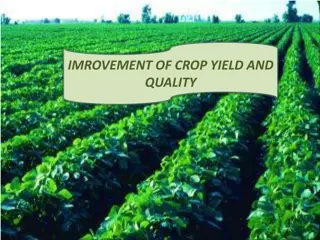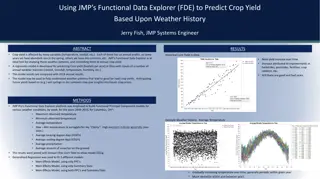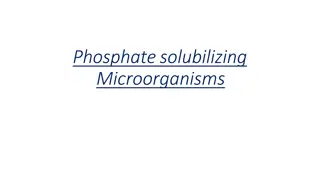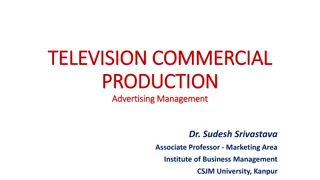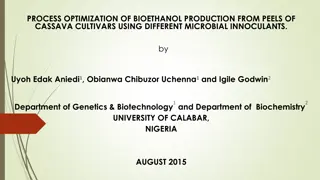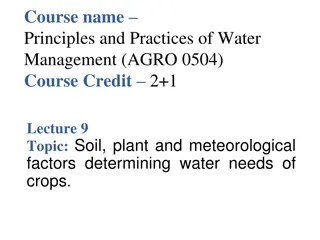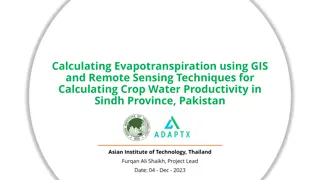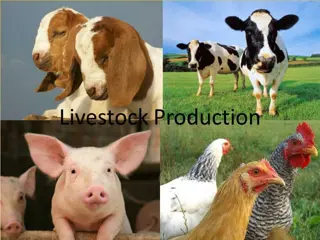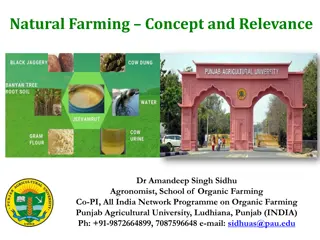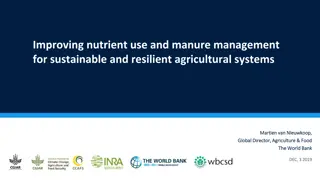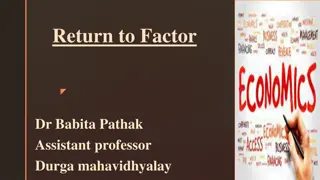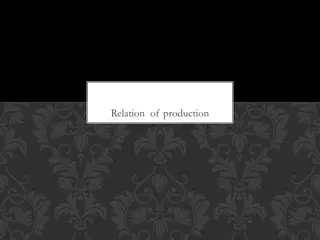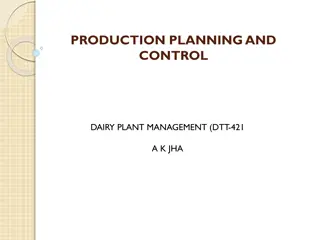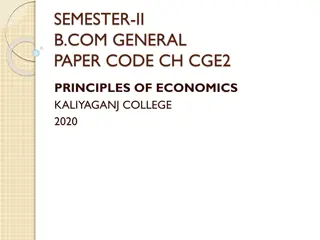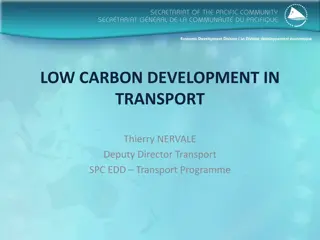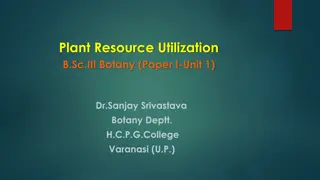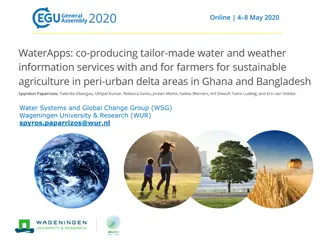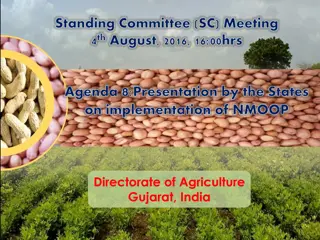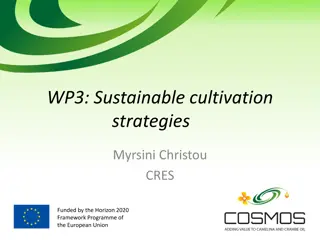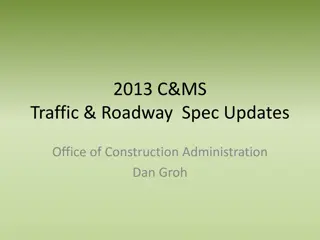Sustainable Mulching Practices for Enhanced Crop Production
Implementing soil-biodegradable mulch in crop production offers an eco-friendly alternative to traditional polyethylene mulch. Benefits include weed control, soil moisture retention, and temperature regulation, with comparable yields to polyethylene mulch. Certified biodegradable options are available, meeting strict criteria for decomposition. The USDA National Organic Program also approves biobased mulch films, emphasizing sustainable production practices for organic farming. Additionally, genetically modified organisms (GMOs) are briefly mentioned in the context.
Download Presentation

Please find below an Image/Link to download the presentation.
The content on the website is provided AS IS for your information and personal use only. It may not be sold, licensed, or shared on other websites without obtaining consent from the author. Download presentation by click this link. If you encounter any issues during the download, it is possible that the publisher has removed the file from their server.
E N D
Presentation Transcript
Soil-Biodegradable Mulch for Crop Production Carol Miles, Washington State University, Shuresh Ghimire, University of Connecticut, and Sam Wortman, University of Nebraska
Alternative to Polyethylene Mulch Polyethylene (PE) mulch disposal: Recycling limited due to soil/plant debris contamination Waste disposal through landfilling and incineration can be limited Can be a source of environmental pollution Mulch removal is time and labor consuming: Equipment facilitates mulch removal (e.g. mulch lifter) Up to 10% mulch reportedly left in the field Mulch Lifter
BDM for Crop Production Soil-biodegradable mulch (BDM) should completely biodegrade, not cause harm to soil ecology, and provide: Weed control Soil moisture retention Temperature modification Comparable yield with PE BDM designed to be tilled into the soil after use, eliminating waste and disposal challenges BDMs rip easily, difficult to remove from field BDMs should not go into recycling facilities, they will contaminate recyclate
Certified Biodegradable Time for biodegradation: Climate and environment dependent: lab test is 2 years, in-field is 4-5 years
Crop Production with BDM Yield Weed Control vs. Bare ground1 Crop vs. PE vs. PE +2 Broccoli Cucumber + = = Eggplant + = - -=3 Lettuce Melon + += Pepper = = - Raspberry + = = Strawberry + -=+ - Sweet Corn + -= - Sweet Potato + += + Tomato + = Zucchini = 1 Bare ground was weed free. 2 + BDM performed better; = BDM performed equivalent to; BDM approximately equal; - BDM did not perform as well; empty cell not measured. 3 Reports provide variable results. Adapted from: Cowan and Miles, 2018
USDA National Organic Program Biodegradable biobased mulch film was added to list of allowed substances on October 2014, but it MUST: 1. Be biobased (ASTM D6866) 2. Be produced without use of non-biobased synthetic polymers; minor additives (colorants, processing aids) not required to be biobased 3. Be produced without organisms or feedstock derived from excluded methods (i.e., synthetic, GMO) 4. Meet compostability specifications (ASTM D6400, ASTM D6868, EN 13432, EN 14995, or ISO 17088) 5. Reach 90% degradation in soil within 2 years (ISO 17556 or ASTM D5988)
GMOs in BDM Genetically modified organisms (GMOs) commonly used in the manufacture of BDM: Feedstocks, such as starch: corn, sugar beet Fermentation of feedstocks: bacteria, yeast Minor additives Difficult to determine GMO status of end product: Source of feedstocks not disclosed DNA degraded after fermentation and processing, thus not measurable No plastic BDMs approved for use in certified organic production Paper BDM is allowed (WeedGuardPlusTM)
Resources Biodegradable Mulch Film for Organic Production Systems https://ag.tennessee.edu/biodegradablemulch/Documents/BDM_for_organic_production_rev_5Apr2016.pdf Biodegradable Plastic Mulch and Suitability for Sustainable and Organic Agriculture http://pubs.cahnrs.wsu.edu/publications/pubs/fs103e/ Biodegradable Mulch Products https://ag.tennessee.edu/biodegradablemulch/Pages/biomulchprojects.aspx Glossary of terms associated with biodegradable mulches for specialty crops https://ag.tennessee.edu/biodegradablemulch/Documents/BDM_glossary_May2015.pdf Impact of Biodegradable Plastic Mulch on Specialty Crop Production https://ag.tennessee.edu/biodegradablemulch/Documents/BDM%20for%20crops-research%20summary.pdf Video - An Introduction to "Performance and Adoptability of Biodegradable Plastic Mulch for Sustainable Specialty Crop Production https://www.youtube.com/embed/B1GGXN1d0aw Video - Biodegradable much: a grower's experience of general benefits and disadvantages https://www.youtube.com/watch?v=kyvB1QxHAtE&list=PLuPJ_NR7ZnVuPh7t7erYYXcVw-h4xg0Xm


